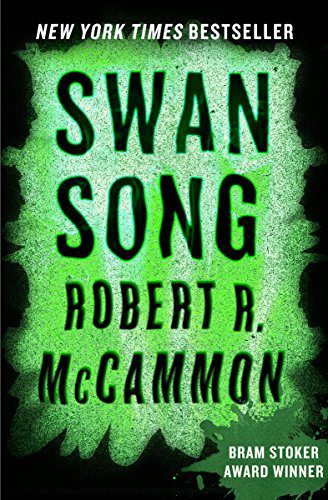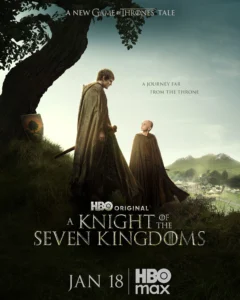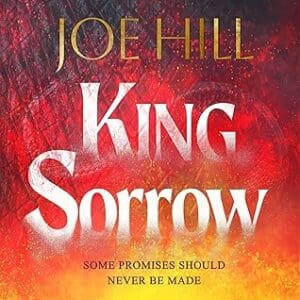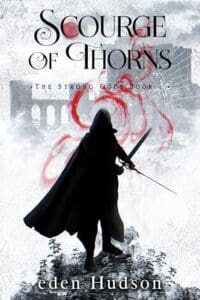
Synopsis:
Swan is a nine-year-old Kansas girl following her struggling mother from one trailer park to the next when she receives visions of doom—something far wider than the narrow scope of her own beleaguered life. In a blinding flash, nuclear bombs annihilate civilization, leaving only a few buried survivors to crawl onto a scorched landscape that was once America.
In Manhattan, a homeless woman stumbles from the sewers, guided by the prophecies of a mysterious amulet, and pursued by something wicked; on Idaho’s Blue Dome Mountain, an orphaned boy falls under the influence of depraved survivalists and discovers the value of a killer instinct; and amid the devastating dust storms on the Great Plains of Nebraska, Swan forms a heart-and-soul bond with an unlikely new companion. Soon they will cross paths. But only Swan knows that they must endure more than just a trek across an irradiated country of mutated animals, starvation, madmen, and wasteland warriors.
Swan’s visions tell of a coming malevolent force. It’s a shape-shifting embodiment of the apocalypse, and of all that is evil and despairing. And it’s hell-bent on destroying the last hope of goodness and purity in the world. Swan is that hope. Now, she must fight not only for her own survival, but for that of all mankind.
Review:
Step into a post-apocalyptic world, where the echoes of humanity’s demise are as mesmerising as they are haunting. Swan Song by Robert R McCammon is a truly spell-binding novel, rich with emotion and depth- I laughed, I cried, I triumphed, and I fully intend to reread it next year. “Swan Song,” has become a rite of passage for fantasy and horror readers alike, and having finished it just an hour ago, it is clear that it belongs in the apocalyptic horror hall of fame, proudly positioned between King’s “The Stand,” and McCarthy’s “The Road.” I can’t believe I allowed my copy to gather dust for so long, and I can only hope that I prompt you to not make the same mistake.
There’s a lot to summarise here, so bear with me. Set against the backdrop of nuclear devastation, we watch various survivors grapple with the harsh realities of the newly-ruined planet, and fight for their fractured lives. Sister Creep was quickly forced to give up the belief that Jesus would take her to heaven in a space-ship, and forced to face her troubled past. Roland, now an orphan, travels with Colonel Macklin; the pair must be merciless if they want to survive. Josh Hutchins tries his hardest not to think about his family at home, and protect the vulnerable child he was buried alive with. This innocent little girl, Swan, holds the key to humanity’s fate in her hands, and is a glimmer of hope in a world that has been consumed by despair. As these disparate souls try to navigate their way through barren wastelands and try to fight off a strange, radiation-caused illness, their paths converge. Each decision they make carries weight, and danger lurks behind every corner.
McCammon’s characters (and there are many of them) are so complex. They’re more than just characters, they’re archetypes, and symbols of the struggle between light and dark, good and evil.
At the heart of this epic saga is Swan. She is a beacon of hope in a suddenly very dark, cruel and unforgiving world. For such a young protagonist, she has been through a lot. Even before World War III starts, her and her mother have been taken advantage of and abused by man after man, and forced to relocate to town after town. Swan has never known real comfort or warmth, and that doesn’t change when the world goes up in flames. Despite this, she remains kind, forgiving and determined. She is representative of grit and resilience, and the possibility of redemption in the face of despair.
Roland Croninger is also central to the novel. From the first time we meet him, entering a military base with his parents, there’s a subtle semblance of something dark within him. When, frankly, everything goes to shit, under the leadership of Colonel Macklin, his violent streak is allowed to flourish. There’s a clear duality between him and Swan. The Colonel and Roland become greedy and unforgiving, whilst Josh and Swan try to avoid confrontation, and just want to survive. I believe there’s a clear commentary on how there’s the capacity for violence within all of us.
Swan’s main adversary is “The Man With The Scarlet Eye,” a malevolent force whose very existence embodies the darkness that threatens to engulf what remains of the planet. With a sinister agenda and a relentless yearning for power, he represents the darkest depths of human nature and the destruction and havoc we are capable of. His ability to shape-shift and transform indicates that evil can hide in plain sight, and even the most attractive of people can be ugly on the inside.
Unlike other works in the post-apocalyptic genre, “Swan Song,” delves deep into the human psyche, with a richness that is both captivating and thought-provoking. In the realm of cinema, Mad Max would be an apt comparison- the narrative is as visually stunning as it is emotionally resonant. It’s a novel that is transcendent of genre. This review could sit quite happily amidst the fantasy and science-fiction. Whilst its fantasy elements are undeniable, McCammon’s depiction of a nuclear-war ravaged society, is very believable, which is what makes it so bloody scary. We dive into the darkest recesses of the human psyche, and can only watch helplessly as what’s left of humanity wage war upon each other.
To conclude, Swan Song is more than just literature, it’s an exploration of resilience and hope. It’s also a warning, with each uneducated tweet, and unresolved conflict- the desolate wasteland McCammon writes becomes less and less fictional. His gripping prose and three-dimensional characters make Swan Song an essential read for everyone, fans of fantasy, sci-fi and horror alike.











Excellent, excellent book!